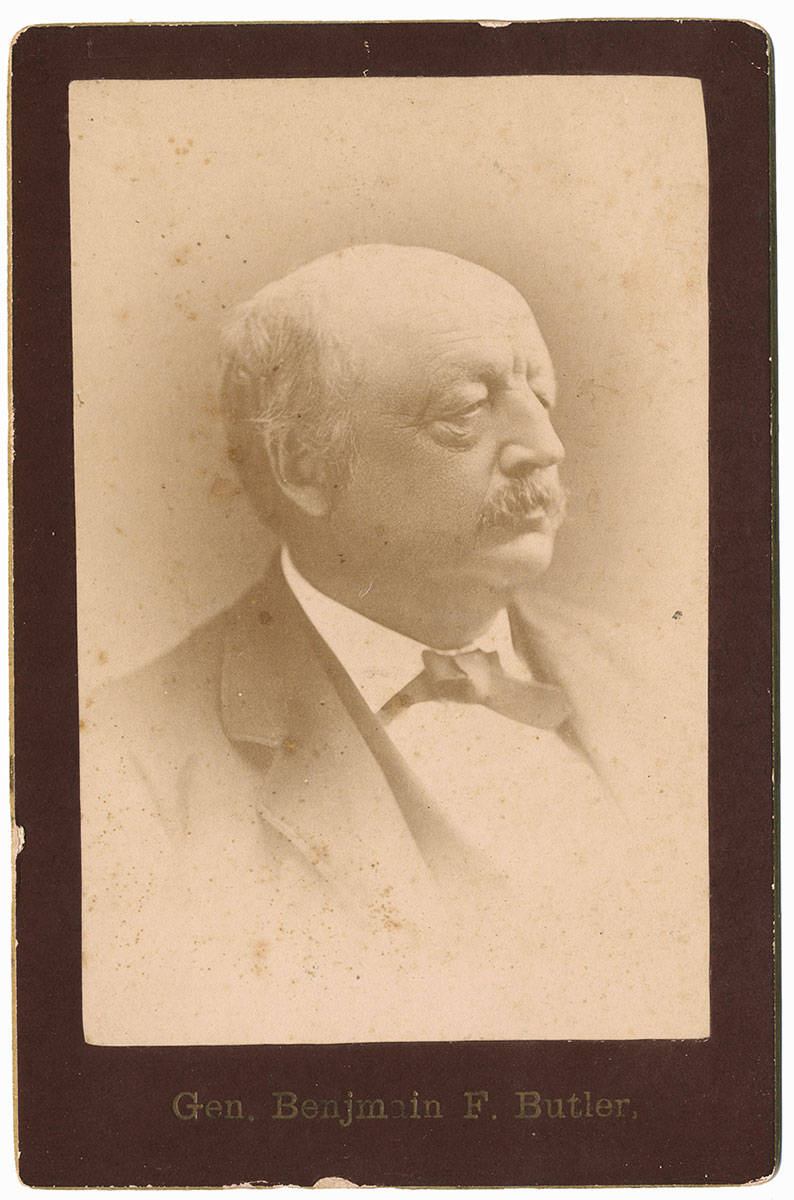site search
online catalog
CABINET CARD OF GEN. BENJAMIN BUTLER

Hover to zoom


$40.00 SOLD
Quantity Available: None
Item Code: 490-6196
Cabinet Card, no photographer's imprint. Brown mount with "Gen. Benjmain [sic] F. Butler" in gold along bottom. Old Butler in civilian clothes. Three-quarter view facing to the right. Fair contrast. In pencil on the reverse is, "Aunt Jennie / July 23 / '96".
Benjamin Franklin Butler (November 5, 1818 – January 11, 1893) was an American major general of the Union Army, politician, lawyer, and businessman from Massachusetts. Born in New Hampshire and raised in Massachusetts, Butler was a politically appointed major general of the Union Army during the Civil War and had a role in the impeachment of President Andrew Johnson.
Butler joined the Union Army, where his lack of military skill was evident time and again. His controversial military governing of New Orleans made him widely disliked in the South and earned him the "Beast" epithet. Butler came up with the idea of designating freed slaves as "contraband of war," an idea that the Lincoln administration endorsed and that played a role in making emancipation an official war goal.
After the war, Butler continued to be very active in State and National politics. Butler died on January 11, 1893, of complications from a bronchial infection, two days after arguing a case before the Supreme Court. He is buried in his wife's family cemetery, behind the main Hildreth Cemetery in Lowell, MA. [JET][PH:L]
~~~~~~~~~~~~~~~~~~~~~~~~~~~~~~~~~~~
THIS ITEM, AS WITH ALL OTHER ITEMS AVAILABLE ON OUR WEB SITE,
MAY BE PURCHASED THROUGH OUR LAYAWAY PROGRAM.
CLICK HERE FOR OUR POLICIES AND TERMS.
THANK YOU!
Inquire About CABINET CARD OF GEN. BENJAMIN BUTLER
Most Popular
Historical Firearms Stolen From The National Civil War Museum In Harrisburg, Pa »
Theft From Gravesite Of Gen. John Reynolds »
Selection Of Unframed Prints By Don Troiani »
Fine Condition Brass Infantry Bugle Insignia »
Large English Bowie Knife With Sheath 1870’S – 1880’S »
Imported (Clauberg) Us Model 1860 Light Cavalry Officer's Saber »
featured item
EXTRAORDINARILY RARE AND IMPORTANT CONFEDERATE RAINS BARREL TORPEDO - 1 OF 2 KNOWN - FROM THE TEXAS MUSEUM
This is a Rains barrel torpedo that was recovered during the Civil War in Mobile Bay, AL. It was developed by Gabriel James Rains, Chief of the Confederate Torpedo Service. Gabriel Rains was born in Craven County, NC and entered West Point,… (1268-690). Learn More »


